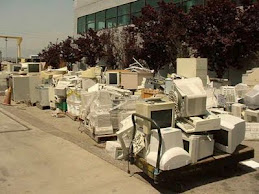According to a United Nations study, the production of a single computer requires 240 kilograms of fossil fuel, 1,500 litres of water and 22 kilograms of chemicals. The extraction of metals such as copper, platinum and tin often causes great ecological damage as well as serious violations of labour rights. Later, when these metals are processed into computer components, the contamination of water and land with copper, nickel and lead continues.
In addition to the ever-increasing number of computer users, older computers are being replaced by new equipment at an ever-increasing rate. The technology industry increasingly operates on very short-term schedules characterized by the rapid acquisition and disposal of hardware.
Although stricter conditions are imposed every day for the reduction of pollutants such as RoHS Guideline (European Community Directive on the restriction of polluting substances) or the ban on the export of e-waste, currently about half of used equipment, the so-called waste electrical and electronic equipment (WEEE) is sent to countries in the South. There, in many cases, the equipment is dismantled by hand and without any kind of health or environmental protection, causing serious consequences for workers and the environment.
It is estimated that in Latin America each person throws away 2 kg of electronic equipment per year. However, pieces and parts of unused electronic equipment do not have to become garbage or waste. With proper management, electronic cards, computer processors, batteries, cables and plastic casings can serve as raw material for new equipment.
Since 2000, the company Reciclametal (based in Quito) has been working on the recovery and recycling of some of the materials that are present in most computers in these approximate percentages: Steel and non-ferrous metals 40% to 70% , Cables and wires 1.5% to 6% , Deployment tubes Up to 6% , Thermoplastic materials Up to 20% , Plastic mixtures 1.5% to 6% , Special materials (batteries, among others) 0.3% to 0.5%.
![]()

